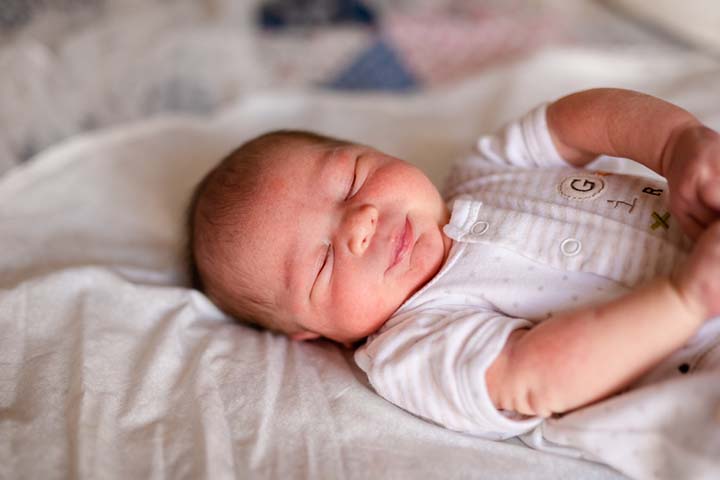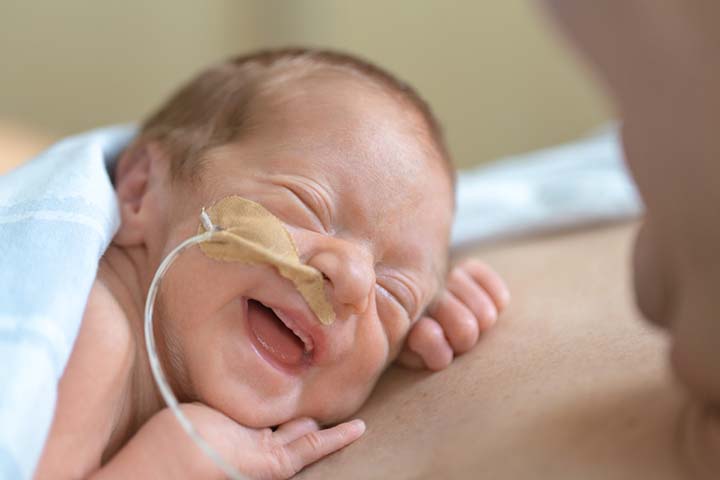During their active sleep, babies make involuntary movements, such as giggles, smiling, or nighttime murmuring. You may have also noticed your baby sigh during sleep. As there is a general perception that sighing means sadness, your baby’s sleep sighs might have made you wonder if your baby is feeling distressed or uncomfortable due to pain in some part of their body. Read this post to know why your baby sighs while sleeping and some facts about your baby’s natural sleeping pattern.
Understanding A Baby’s Sleep Sigh
Yes, babies do sigh a lot in their sleep. But a sigh during sleep is nothing to worry about as it indicates a relaxation response, ensuring that your baby’s body is taking care of itself. In fact, it is a sign of a healthy sleep pattern (1).
There has only been limited research on baby sleep sighs and the role they play in the development of babies. These studies, however, indicate a few good reasons why babies sigh in sleep.
- When babies sigh in sleep, this movement aids the lung airways to open up and absorb more oxygen. A baby’s lungs are still developing, and his tiny airways may need some support from time to time to work efficiently (1).
- A sigh simply helps regulate breathing in babies. A baby’s sleep sigh may help form short-term memory patterns, which may affect his breath movements and the gaps between each breath (1). A sigh reflex may also help a baby respond well to different noise levels and varied movements through this type of breath regulation.
- A baby’s sleep sigh may also give a boost to his autonomic nervous system (ANS). ANS regulates many internal organs such as the heart and the digestive organs 2. It also controls many muscles and glands in the body. A baby’s sigh helps to reset the ANS (3). A healthy ANS can prevent many disorders later in life such as those that relate to the heart and the respiratory organs (4). Hence, it is important to ensure that there is no sleep deprivation in babies.
Some Interesting Facts About Babies’ Sleep Sigh
- Preterm babies tend to sigh more than term babies (5).
- Babies sigh more during Rapid Eye Movement (REM) sleep (6). REM sleep is synonymous with an increase in the brain’s activities. During this ‘active’ sleep cycle, our bodies are immobile, and our heart and respiratory rates become irregular when compared with Non-Rapid Eye Movement (NREM) sleep or ‘quiet’ sleep cycle.
- One important factor to consider for a better understanding of a baby’s sigh is to know about the apneic pause. The pause refers to an interruption of airflow for about a few seconds during normal breathing. A sleep sigh in babies can occur with or without apnea. during various sleep stages. During REM, sighs without apnea occur while the opposite is true for non REM sleep cycles.
Some Baby Sleep Facts
A better understanding of your baby’s natural sleep cycle will allow you to help him sleep better (6).
- Newborns may sleep anywhere between 14 and 17 hours a day. Some newborns may even sleep for 18 to 19 hours a day.
- Every baby’s sleep needs and patterns may differ. It is important to let babies enjoy their natural sleep rhythms. But this in no way means you can’t help your baby develop regular sleep schedules. Regular nighttime routines may help your little one to sleep more peacefully. But it is important to work them around your baby’s natural rhythms.
- Sleep patterns may affect neonatal development and growth patterns.
A study determined the accuracy of a mother’s perception of the relationship between infant feeding methods and sleep. The study recorded the mother and baby’s sleep duration and compared the mother’s perception of the infant’s sleep time to the actual data measured by actigraphy (monitoring human rest/activity cycles).
Findings highlighted maternal perceptions of night-time infant sleep vary based on infant age and feed type. In early infancy, maternal reports of infant sleep closely matched actigraphic data. However, as infants reached 8-18 weeks of age, the differences in values between maternal reports and actigraphic data increased.
The findings also revealed that exclusively breastfeeding mothers overestimated the longest sleep period (LSP) to a lesser extent than formula-feeding mothers.
Comparison of sleep periods of breastfed and formula-fed infants
Source: Biologically normal sleep in the mother-infant dyad; American Journal of Human Biology
Connection Between A Baby’s Good Sleep Cycle And Health
A study indicates that a healthier sleep pattern during infancy may affect a baby’s mental and physical growth (7) So, if your baby sighs in sleep, rest assured that he is sleeping well. Healthier sleep patterns may indicate optimum growth spurts in babies. But it is important to always monitor your baby’s sleep patterns and look for signs of sleep disturbances so that you may know in time if your baby needs to see a doctor. So, rest assured and take comfort in your baby’s sigh!
If you have witnessed your baby sigh during sleep, it is an indication that they are sleeping well and healthy. It is a part of their sleep behavior through which they regulate their breathing and internal organs, ensuring sound sleep and healthy development. The sighing allows the baby’s airways to open up, letting the lungs absorb more air. It can eventually help the baby sleep better. Moreover, sound sleep is the key to good health. So do not worry if your baby sighs quite often while sleeping.
Key Pointers
- Babies who sigh during sleep exhibit a healthy sleep pattern, regulating their breathing, increasing oxygen absorption, forming short-term memory patterns, and boosting their autonomic nervous system.
- Increased brain activity, interrupted airflow, and irregular breathing and heart rates during REM sleep cause babies to sigh more.
- For a baby’s physical and mental growth, it is crucial to maintain regular sleep schedules, nighttime routines, and a natural uninterrupted sleep rhythm.
Learn all about baby sleep in this informative video! Get tips on how to help your baby get the rest they need.













